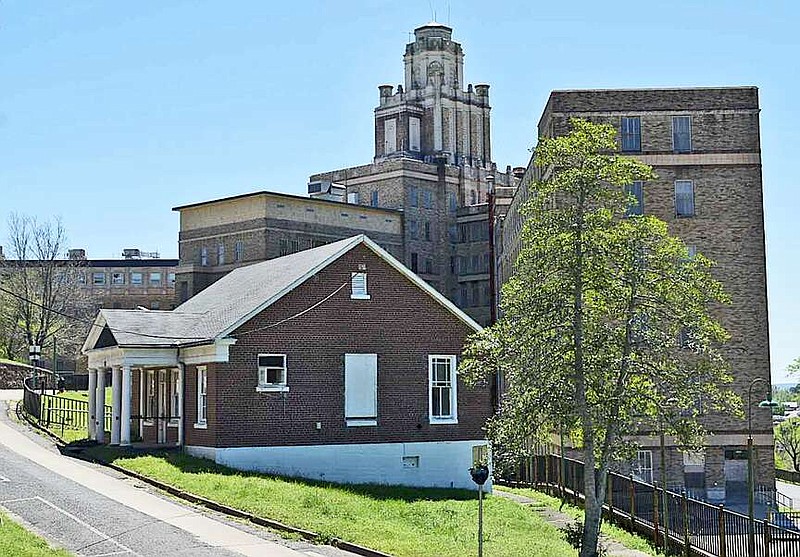HOT SPRINGS -- The more than 200,000-square-foot Mission/Spanish-style building that looms over downtown has been a liability since the state vacated it five years ago, but the outbuildings behind the Army and Navy General Hospital are just as problematic.
One of the leaders of the Greater Hot Springs Chamber of Commerce's future of the Army and Navy Hospital executive committee said a half-dozen or more of the accessory structures need to come down.
"We're not dealing with a big building everybody sees, and that's all anybody talks about," Dr. Jack Porter said Tuesday. "We're talking about 30 buildings on 20 acres, six to nine of which are a great threat should fire happen to downtown Hot Springs."
Porter has said the buildings, hard against Hot Springs Mountain's southern slope, are potential fuel for a fire that could consume the mountain and affect the thermal springs that rise from its western shoulder. He said their demolition should be the foremost priority.
"If you could do that, Hot Springs and the national park could breathe a sigh of relief that at least we're not going to burn up," he told the board.
But dense layers of state and federal agencies have to be negotiated before any tangible action can occur. Porter and the committee have been sorting through the bureaucratic tangle since the state announced its departure in 2019. Ownership remains an open question, with neither the state nor the Army wanting to take possession of the forlorn property.
High levels of contamination revealed by 2019 and 2023 site assessments have to be remediated before the Army can dispose of the property, the U.S. Army Corps of Engineers said.
According to its executive summary from the 2023 assessment, the federal Superfund statute requires environmental liabilities to be resolved before a property can be transferred to the General Services Administration, the way station for properties federal agencies no longer want.
"The state does not want it," Porter said. "It should've gone back to the Department of the Army, according to the initial deed. It has not done that. The Department of the Army says it does not serve their purposes. They were going to pass it off to GSA. The GSA cannot accept it because it's contaminated. Remediation of the property is extremely important."
In the interim, keeping the utilities on and maintaining a security presence are the priorities, ones provided for in the more than $800 billion fiscal year 2024 defense appropriations bill signed into law last month.
An amendment Arkansas' U.S. Rep. Bruce Westerman, of Hot Springs, included in legislation authorizing the appropriation provided up to $2.75 million in fire suppression and security grants for which the state can apply.
Porter said a representative from the Defense Department's granting agency who toured the property last month indicated receipt of the funds isn't a given.
"He was somewhat skeptical of the chance of getting that grant money," he said. "It still has to go through a process of it being applied for and accepted. It has to be done by June, and the appropriation made by February. We're trying to figure out how that's going to work, and who's going to be responsible and how expeditiously they can fill the requirements necessary to do that."
A spokesperson for Gov. Sarah Huckabee Sanders said Wednesday the state Department of Transformation and Shared Services will be applying for the grant.
"While the Sanders administration had no say so in decisions that were made before we took office, this governor and her team have worked with local and federal officials to find a solution concerning the future of this property," Communications Director Alexa Henning said. "Gov. Sanders is appreciative of our partners in Congress for their work to secure this critical funding."
The state left the property unsecured for more than two years after it ended the residential job training program for young adults with disabilities the property had hosted since 1960. Porter told a local civic club in 2022 that vagrants and vandals had exploited the security vacuum, establishing a "lawless camp" in the main building.
The state contracted Allied Universal Security Services for round-the-clock security the following month. The contract was extended through May of this year for $223,684 and can be renewed annually through May of 2029, according to a copy the state provided last year in response to a records request.
"The protection is not up to the standard I would say is anywhere adequate," Porter said Tuesday. "It's a minimal standard, but it's cut down on trespassing and vagrancy."
